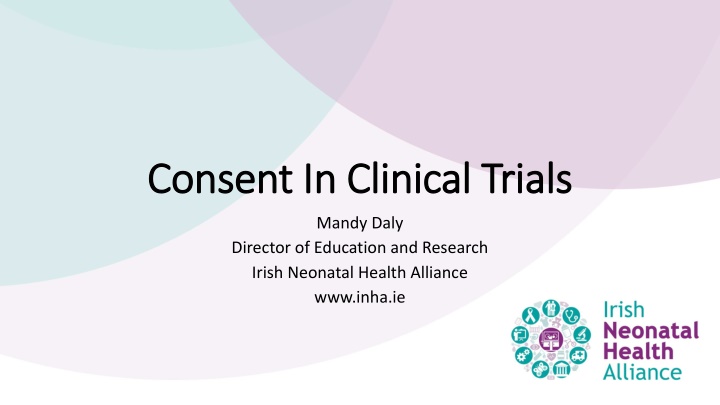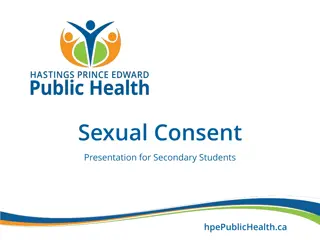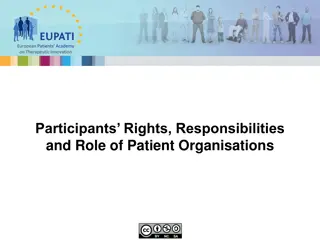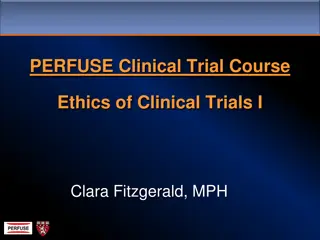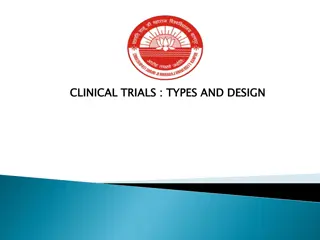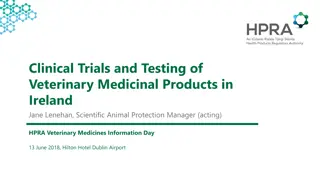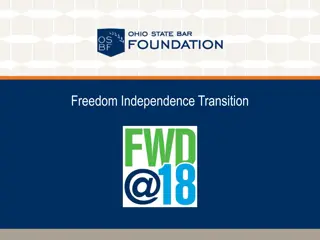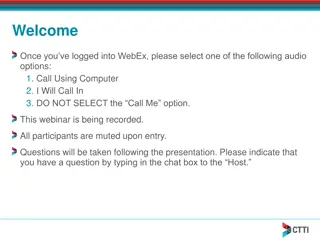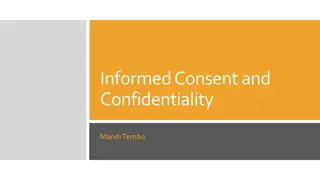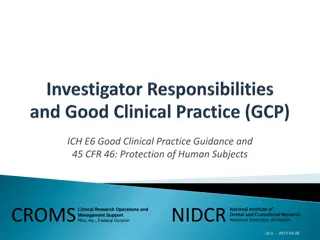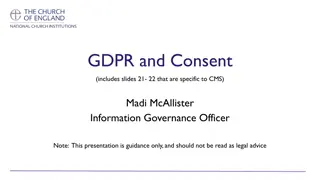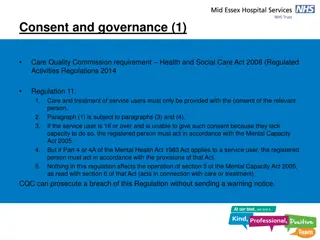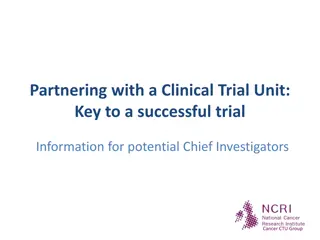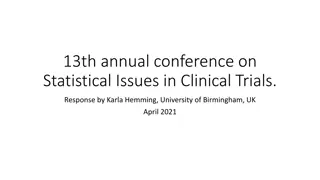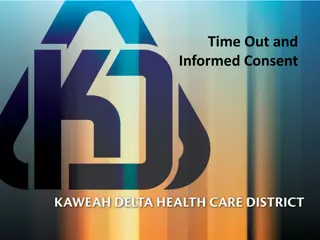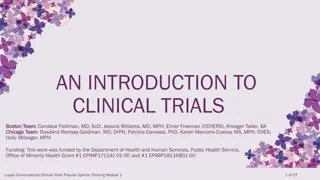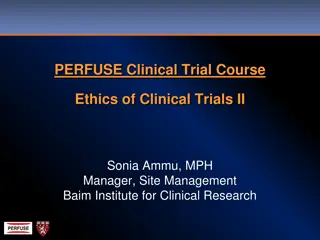Informed Consent in Clinical Trials
Informed consent in clinical research is a foundational principle of research ethics, involving the communication process, respect for participant rights, and ethical principles such as autonomy, beneficence, justice, and solidarity. Participants have core rights that need to be upheld, including self-determination, fair treatment, non-harm/exploitation, and privacy/confidentiality. The consent process ensures that participants have adequate information, time to decide, voluntary consent, data protection, non-discrimination, and the ability to withdraw consent without affecting their care.
Download Presentation

Please find below an Image/Link to download the presentation.
The content on the website is provided AS IS for your information and personal use only. It may not be sold, licensed, or shared on other websites without obtaining consent from the author.If you encounter any issues during the download, it is possible that the publisher has removed the file from their server.
You are allowed to download the files provided on this website for personal or commercial use, subject to the condition that they are used lawfully. All files are the property of their respective owners.
The content on the website is provided AS IS for your information and personal use only. It may not be sold, licensed, or shared on other websites without obtaining consent from the author.
E N D
Presentation Transcript
Consent In Clinical Trials Consent In Clinical Trials Mandy Daly Director of Education and Research Irish Neonatal Health Alliance www.inha.ie
Are you? Start presenting to display the poll results on this slide.
Informed Consent In Clinical Research Informed Consent In Clinical Research One of the founding principals of research ethics. Consent is the giving of permission for, or agreement to, participation in research, following a process of communication about the proposed intervention. Researcher values the rights, beliefs and opinions of the participant. Rolling, dynamic, ongoing process of communication v s a single time point. Ethical requirement to protect the dignity and rights of the participant intertwined with the legal requirements to comply with data protection legislation.
Ethical Principals Underpinning Consent Ethical Principals Underpinning Consent Respect for persons (respect for individual autonomy and self- determination, in addition to protection of individuals with diminished, or without, decision-making capacity). Beneficence (efforts to reduce the risk of harm, and to maximise benefits to the participant, which are usually availed of by members of the larger society). Justice (fairness in selection and treatment of research participants). Solidarity (empathy, fellowship, and a commitment to work for the good of a research participant from the perspective of partnership), which also applies to participants and the reasons they participate in the first place; solidarity represents a willingness to carry costs in order to assist others with whom a person recognises a sameness, shared situation, or cause.
Participant Rights Participant Rights The core rights of individuals that need to be respected in accordance with these ethical principles while obtaining consent for research include the rights to: Self-determination . Be treated in a fair manner . Not be harmed or exploited. Privacy and confidentiality.
The Consent Process. The Consent Process. Prospective trial participant has:- Enough information provided to him/her to allow them to make an informed decision. Is allowed sufficient time to digest and assess that information before being expected to make a decision. Consent is freely given and voluntary. Consent can be withdrawn. The minimum amount of personal data necessary for the study is being sought. A decision not to consent will not impact on any care or treatment they receive.
The Consent Process The Consent Process Consent should be obtained before the participant enters the research, and there must be no undue influence on participants to consent. Standard consent process for competent adults: Stage 1 (giving information): the person reflects on the information given; they are under no pressure to respond to the researcher immediately. Stage 2 (obtaining consent): the researcher reiterates the terms of the research, often as separate bullet points or clauses; the person agrees to each term (giving explicit consent) before agreeing to take part in the project as a whole. Consent is then deemed to have been obtained.
Framework Supporting the Consent Process Framework Supporting the Consent Process Subject to EU Clinical Trial Regulation 2004 and No 536/2014 (CTR.) Defined in Article 4 of the General Data Protection Regulation (GDPR). Assisted Decision Making (Capacity) Act 2015. Data Protection Act 2018. National Policies i.e. HSE National Policy for Consent in Health and Social Care Research. International guidelines i.e International ethical guidelines for health- related research involving humans, Council for International Organizations of Medical Sciences
Capacity To Consent Capacity To Consent The ability to use and understand information to make a decision, and communicate any decision made. Change over time. Impaired capacity:- Lacks understanding about the decision. Cannot remember the information use the information to make a decision. Communicate the decision by talking, using sign language etc.
Types of Consent Types of Consent Written Oral Consent Oral Informed Consent E-Consent Tiered Consent Emergency Consent Consent for Incapacitated Adults Consent for Minors Consent for Neonates
Written Oral Informed Consent Written Oral Informed Consent Understanding complex material is not an issue. Reading and writing is not problematic. Overarching requirements : Voluntary Adequate time Questions addressed Minimum personal data collected Standard of Care unaffected
Oral Informed Consent Oral Informed Consent An oral consent process is where the researcher and participant have a conversation to give information and obtain consent. There is no paper form to sign. Record must be kept. It is normally used: Where literacy is a problem. Where there are cultural or political concerns with signing contract-like documents. Where either the researcher and/or the participant could be put at risk by existence of a paper record. Where time for consent is limited, for research conducted via remote video conferencing software.
E E- -Consent Consent Electronic consent methods may be used for seeking, confirming, and recording consent in research studies, particularly in the context of obtaining consent remotely/off-site. Electronic form, email, uploading a scanned signed document, using an electronic signature. Must have an option to ask further questions. E-Consent platform facilitates dynamic consent process.
Tiered Consent Tiered Consent Layering the consent form allows individuals to select from a graduated set of consent options with respect to the storage and future use of their material or data. A layered consent form might include options such as: Permission for material/data to be stored for possible future research related to the current study only if consent is obtained at the time of the future research. Permission for material/data to be stored for possible future research related to the current study without further consent being required.
Tiered Consent Tiered Consent Permission for material/data to be stored for possible future research unrelated to the current study only if consent is obtained at the time of the future research. Permission for material/data to be stored for possible future research unrelated to the current study without further consent being required. A distinction should be made between consent for any clinical procedures or tests and consent to research participation separate discussions and separate consent. Biobank custodian responsibilities confidentiality, appropriate facilities, policies and safeguards, respecting preferences.
Emergency Consent Emergency Consent Research in emergency situations involves individuals who have a life- threatening medical condition that necessitates urgent intervention (for which available treatments are unproven or unsatisfactory), and who, because of their condition (e.g. traumatic brain injury) cannot provide consent. In emergency situations, when it is not possible to obtain the consent of the prospective participant, then the consent of the participant s legal representative should be sought. If there is no legal representative present then the individual can only be enrolled in research if : The research addresses the emergency needs of the individual involved. The experimental interventions have a realistic probability of benefit equal to or greater than standard interventions. The risks associated with the research are reasonable in view of the critical nature of the condition and the risks associated with standard interventions.
Consent for Neonates Consent for Neonates Where possible get consent ante-natally. Ideally obtain consent in the presence of both parents. Consideration for the family situation. Assent in an emergency situation followed by formal consent.
Consent for Incapacitated/Vulnerable Adults Consent for Incapacitated/Vulnerable Adults The research should only be undertaken if the required knowledge cannot be obtained by conducting research involving adults with decision-making capacity. The research is expected to provide a direct benefit to the participants or to provide knowledge about the cause or treatment of the impairing or similar condition. Where there is no prospect of direct benefit for participants, the risks involved should be no more than minimal.
Consent for Incapacitated/Vulnerable Adults Consent for Incapacitated/Vulnerable Adults Consent for participation must be sought from the person s legal representative. Assisted Decision Making (Capacity) Act 2015 & 2022. A Research Ethics Committee must approve the participation of adults lacking decision-making capacity in research taking all of the above factors into consideration. The explicit wish of a participant to refuse participation in or to be withdrawn from the study must be respected.
Regained Capacity Regained Capacity Participants who regain capacity or post emergency consent, should be given all the relevant information and their consent to continued participation should be obtained as soon as is reasonably possible. The option to withdraw and to seek the destruction of any biological material or data collected as part of the study should also be given.
Consent for Minors Consent for Minors For the purposes of participation in clinical trials, anyone over the age of 16 years can consent on his/her own behalf. For all other research, the person must be over the age of 18 years in order to provide consent. The research should only include children where the relevant knowledge cannot be obtained by conducting research involving adults. The purpose of the research is to generate knowledge about the health or social care needs of children. The research does not pose more than minimal risk unless there is a prospect of direct benefit for the participants.
Consent for Minors Consent for Minors The research has been designed to minimise pain, discomfort, fear and any other foreseeable risk to the child or his/her stage of development. Consent to the child s participation must be obtained from a parent/legal guardian Whenever s/he has sufficient competence to provide it, the child s assent must be sought in a child appropriate manner. A child s refusal to participate or continue in research must be respected. Age appropriate consent material should be developed.
Assent by Child Assent by Child In addition to the parent s/legal guardian s consent for the child s participation in research, the child s assent to participate, and for the processing of their data for research purposes, should also be obtained. Respect the child s decision to participate or not. Older children, who are more capable of giving assent, should be invited to participate in research before younger children, unless there are valid scientific, age-related reasons for involving younger children first, which can be demonstrated as part of the research ethics approval process.
Reconsent Reconsent As the consent process is a dynamic one it should consist of a continued exchange of information for the duration of a study. Reconsent may be required where: The research protocol has been substantially altered. New safety information has come to light. Alternative treatments have become available. A child participant reaches legal maturity (i.e. 18 years or 16 years in the case of clinical trials). A formerly incapacitated adult has regained capacity. A substantial period of time has elapsed since the original consent was obtained (e.g. longitudinal study).
Incidental Findings Incidental Findings Unanticipated discoveries made in the course of research but that are outside the scope of the research. Medically relevant incidental findings (IFs) are findings that have been interpreted as having significant implications for the participant, whether health-related, psychological or social. Consent process must offer the participant the option to be made aware or not of incidental findings. Research Ethics Committee to approve plan to review IFs which results warrant disclosure, managing disclosure, arrangements for medical advice, referrals etc.
Incidental Findings Incidental Findings Incidental findings to be confirmed by an accredited laboratory. Participants to be advised that duty of care exists during the consent process. Researchers to protect the confidentiality of research participants. Certain information can be made available to public health officials without participant consent i.e. infectious diseases
Withdrawal of Consent Withdrawal of Consent Prospective research participants : must be informed from the outset that they can withdraw from a study at any time. that they need not offer any explanation for wishing to withdraw. that their decision will not impact on the services being provided to them. where an individual wishes to have his/her biological material or data withdrawn from a study, every effort should be made to respect his/her wishes.
Exceptions Exceptions Once the research results have been published or disseminated in other ways, such as by being deposited in a publicly accessible database. Therefore, consent documentation should clearly indicate what circumstances would prohibit the withdrawal of biological material or personal data. In the case of anonymous biological material/data, prospective research participants should be informed during the consent process that it will not be possible to withdraw their material and/ or data.
When Consent Is Not Required When Consent Is Not Required The Health Research Consent Declaration Committee, HRCDC, considers health research applications seeking a consent declaration to lawfully conduct health research using personal data without the consent of the research participant. The HRCDC may make a consent declaration where the public interest in the health research significantly outweighs the public interest in obtaining explicit consent i.e. public health emergencies. Legal Framework: Data Protection Act 2018 (Section 36(2)) (Health Research) Regulations 2018 (S.I. No. 314 of 2018), appointed by and reporting to the Minister for Health
Waiver of Consent Waiver of Consent Before a waiver of consent can be granted, the researcher must satisfy the Research Ethics Committee that: The overall benefit to research is real and substantial. The benefits from the research justify any risks of harm associated with not seeking consent. It is impracticable to obtain consent (for example, due to the quantity, age or accessibility of records). There is no known or likely reason for thinking that participants would not have consented if they had been asked. There is sufficient protection of their privacy. There is an adequate plan to protect the confidentiality of data.
What You See What You See
Reality Reality Fear Anger Worry Guilt Love Despair Hope
Know Your Audience Know Your Audience Know Your Audience Recruiter Selection PPI Led Recruitment Check
Study Recruitment Study Recruitment Approach & Introduction Time Infant & Family Well-Being Enquire Listen Attentively Explain Study Q & A Observe
Participant Material Participant Material Participant Information Leaflets, Posters, Videos, Advertisements, Informed Consent, Interview Questions. Rephrase Use Pictures/Drawings Repetition Flexibility Patience Understanding Prepare for triggers Support Participant Information Sheet supports the Consent Process
The Ideal Participant Information Leaflet The Ideal Participant Information Leaflet Short sentences (no more than 20 words per sentence), plain and simple language. Use short familiar words. Introduce one idea per sentence. Use a lay term followed by the technical equivalent in brackets i.e. feeling sick (nausea).
The Ideal Participant Information Leaflet The Ideal Participant Information Leaflet Be cognisant of using words with specific regional use i.e. ER, ED, A & E. Choose a font suitable to the intended audience i.e. larger font for the elderly population. Use flow diagrams and infographics. Know your audience and tailor the Patient Information Leaflet to them i.e. visually impaired, neurologically impaired.
The Ideal Participant Information Leaflet The Ideal Participant Information Leaflet Written from the perspective of the participant. Use patient friendly language and format. Onus is on the researcher to justify why certain information is not included in the Patient Information Leaflet. Must state that no attempt will be made to access individuals data if they do not provide consent.
The Ideal Participant Information Leaflet The Ideal Participant Information Leaflet Title, purpose i.e. What research question is being addressed and duration of the research. The sites where the study is to take place. A description of the procedures to be carried out during the study, the drug/intervention to be tested, and an identification of any procedures which are experimental. Who is eligible to participate? If patients and the public have been involved in the study design.
The Ideal Participant Information Leaflet The Ideal Participant Information Leaflet If standard of care treatment be impacted during or after the study. Description of the personal data to be collected and used. A description of anonymization, randomisation, blinding and the screening process. A description of any reasonably foreseeable risk, discomfort, disadvantages and side-effects. A disclosure of appropriate alternative procedures for treatment/diagnosis, if any, that might be advantageous to the participant.
The Ideal Participant Information Leaflet The Ideal Participant Information Leaflet Advice to potential participants about the risks of becoming pregnant, of fathering a child, or of breast-feeding whilst taking part in the research. Clear information should be provided for men and women. If the participants General Practitioner will be involved. Disclosure if ionising radiation is to be used during the study, why and the dosage. A description of how incidental findings are to be handled.
The Ideal Participant Information Leaflet The Ideal Participant Information Leaflet A description of any planned genetic tests, including whether results will be disseminated to research participants. An explanation as to whether there are any treatments or compensation if injury occurs and, if so, what they consist of, or where further information may be obtained. Insurance coverage should be mentioned. Reason why identifiable rather than anonymised data is required. Enumeration of potential benefits that may arise from the research
The Ideal Participant Information Leaflet The Ideal Participant Information Leaflet Clarification on whether the individual providing the personal data will be advised of any outcome from the research that would impact directly or indirectly on his or her health A statement that consent must be freely given and voluntary, that a decision not to consent will have no adverse consequences and advice on how consent can be withdrawn (before anonymisation of the data or publication of results) and the effect of any such withdrawal. How and to who the trial participant can make a complaint in relation to the research. Information about what will happen to the results of the research.
The Ideal Participant Information Leaflet The Ideal Participant Information Leaflet Information about reimbursement in relation to expenses incurred by participants. If the research involves any potential conflict of interest, the researcher must inform participants about this situation. What happens when the study finishes. Plans to conduct genetic studies must be clearly disclosed and sensitively handled with full disclosure around genome-wide analyses that may involve looking at genes un-related to the study.
Who Is Conducting The Study Who Is Conducting The Study The data controller contact details and the name and contact details of the data protection officer. Name, title and contact detail of Principal Investigator and relationship to the data controller if he or she is not the data controller. If there is a data processor, the name and contact details of that data processor and why it is necessary to have a data processor. Confirmation that the persons carrying out the research or otherwise having access to the personal data are bound by a professional code of confidentiality or a contractual code of secrecy (that would means disciplinary action for employees who disclosed or facilitated unauthorised access to the personal data.
Who Is Conducting The Study Who Is Conducting The Study Specification of any person who provides funding for, or otherwise supports, the project and any direct or indirect access that person will have to the personal data collected this is particularly relevant to any commercial involvement with the research and/or the researcher. Confirmation that training in data protection law and practice has been provided to those individuals involved in carrying out the research. Contact details to access information about the research and research participants rights.
Obtaining, Use, Storage And Disclosure Of Obtaining, Use, Storage And Disclosure Of Personal Data Personal Data Identification of the healthcare providers or other persons the personal data will be sought from. Confirmation that arrangements are in place so that personal data will be processed only as is necessary to achieve the objective of the health research and will not be processed in a way that damage or distress will be caused to the trial participant. Length of time the personal data will be kept (in an identifiable or pseudonymised format), why it is necessary to keep it for that period and where it will be kept.
Obtaining, Use, Storage And Disclosure Of Obtaining, Use, Storage And Disclosure Of Personal Data Personal Data Arrangements to be made for the personal data to be archived or destroyed. Specification of any person to whom it is intended to disclose the personal data collected (whether in an identifiable, pseudonymised or anonymised form). Will the results of the research be used or disclosed for commercial purposes.
Obtaining, Use, Storage And Disclosure Of Obtaining, Use, Storage And Disclosure Of Personal Data Personal Data Description of the data security arrangements in place. Confirmation that an assessment of the data protection implications of the health research and /or a data protection impact assessment was carried out and an indication of the level of risk identified by either or both. Statement as to whether the personal data collected will leave the State and if so what countries it will go to and why it is going to those countries.
Research Ethics Committee Research Ethics Committee The name and contact details of the Research Ethic Committee that gave ethical approval to the research and whether any of the persons carrying out the research have a link to the Committee or the institution behind the committee. The date ethical approval was given by the Committee. Reporting arrangements agreed with the Research Ethics Committee. Any conditions attached to the research by the Committee.
